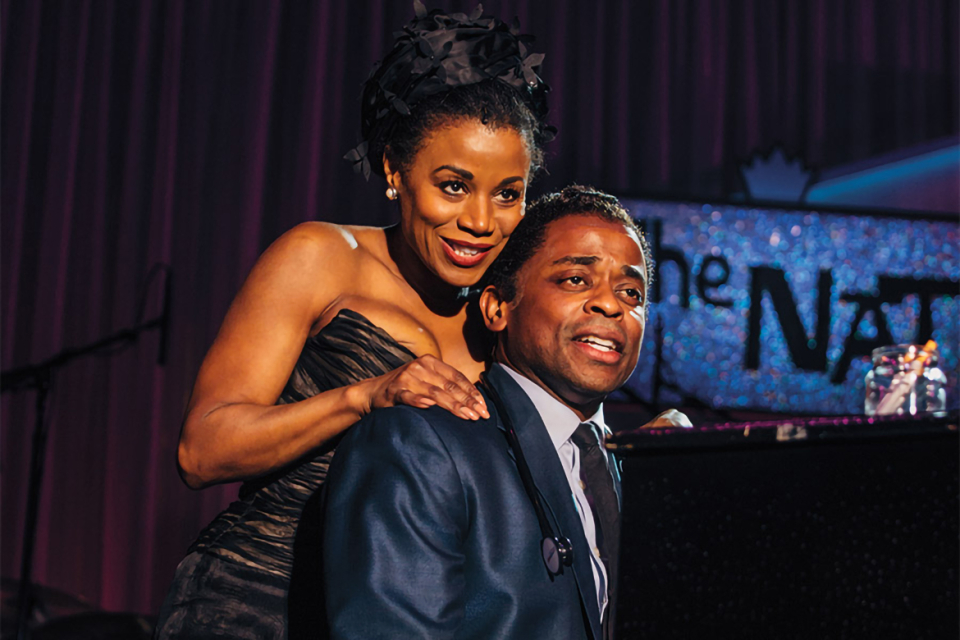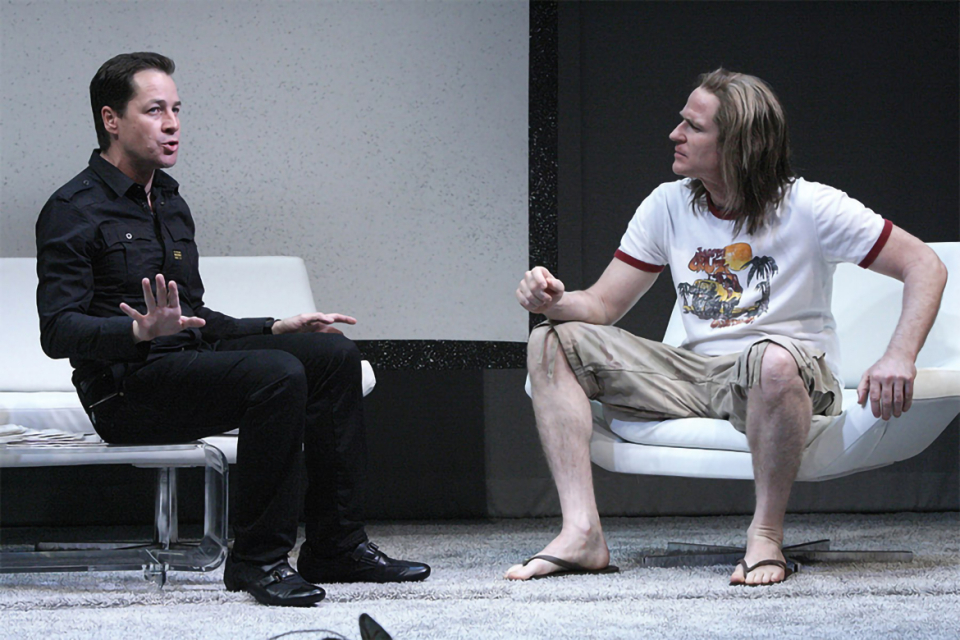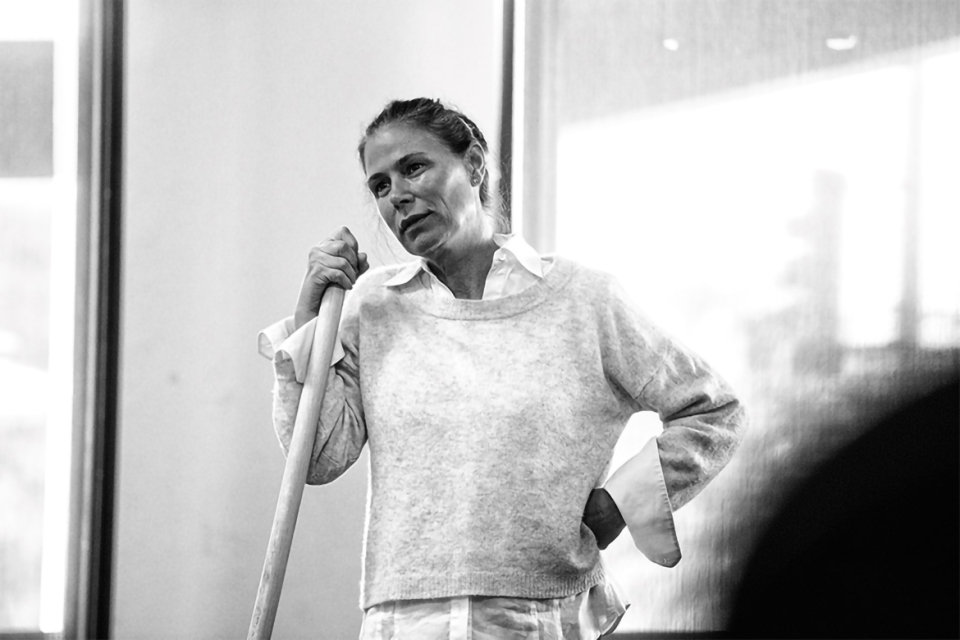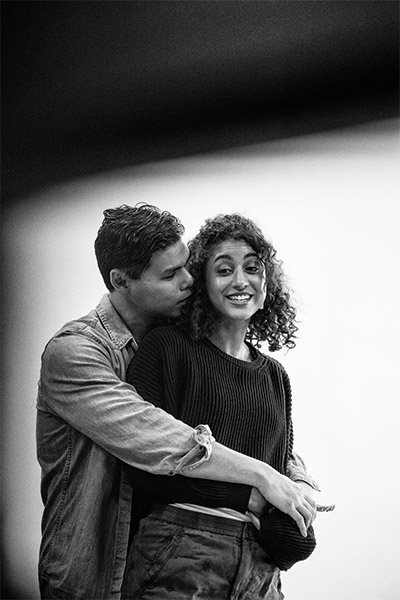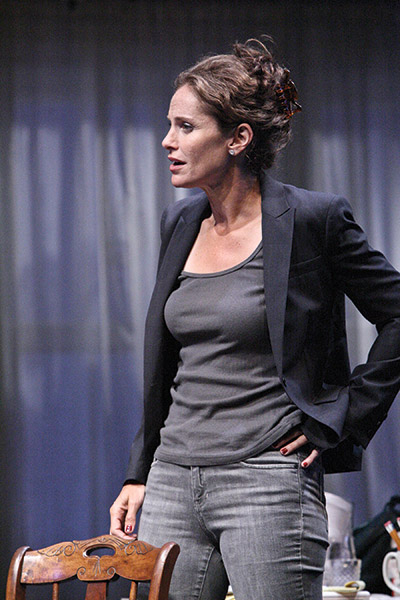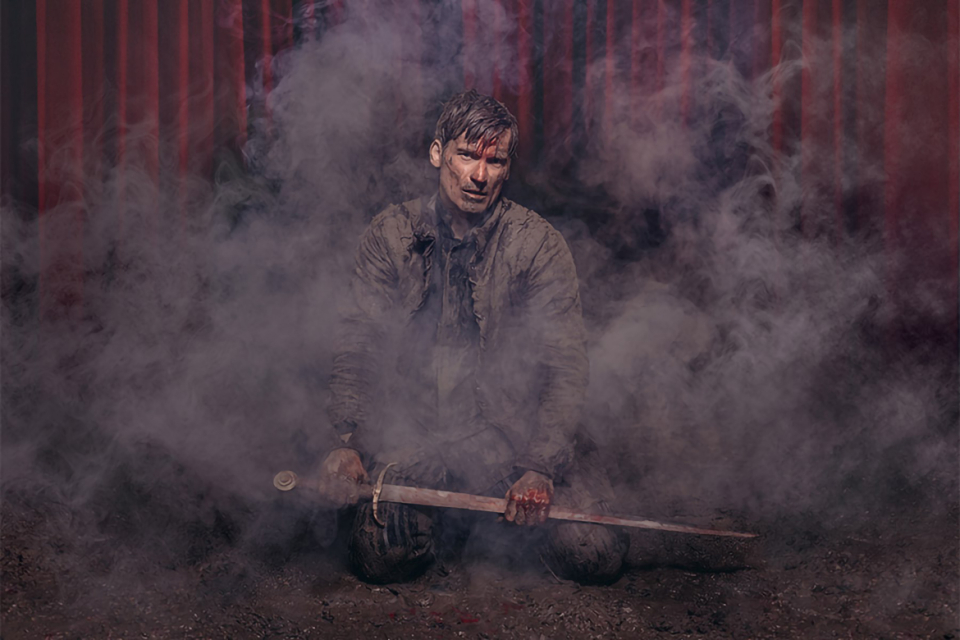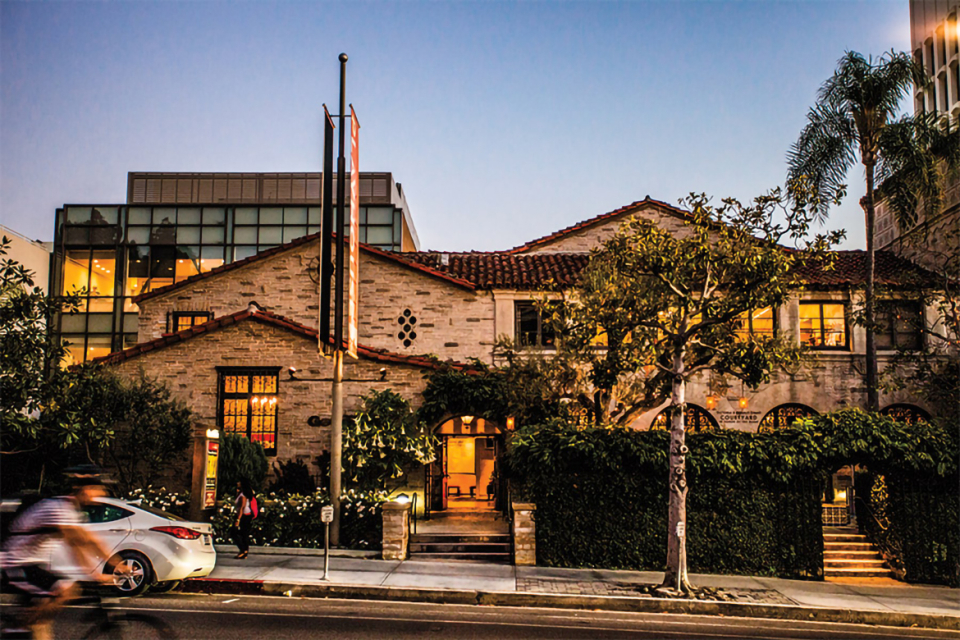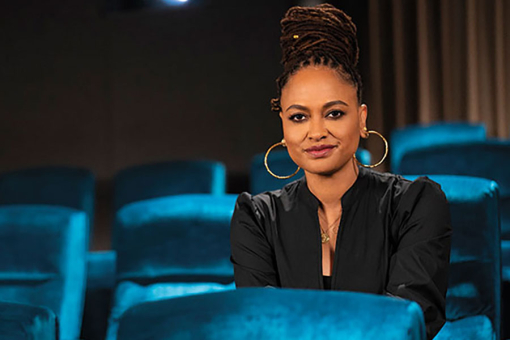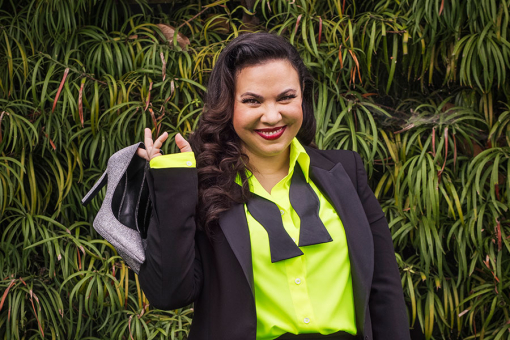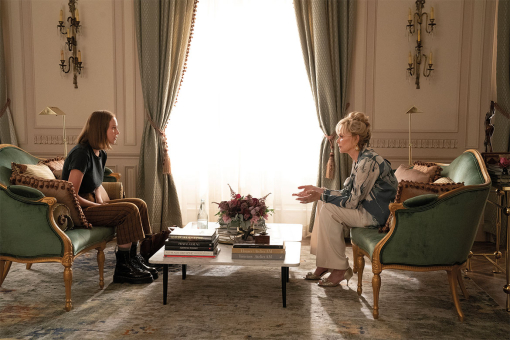"Our mother tongue." "my first language." "home."
Ask successful television and film actors why they perform in plays, and their responses seem to come from deep in their creative souls. That's why so many of them tread the boards between shoots.
And they don't have to fly across the country to do it. On any given day in southern California, famous faces grace stages from Pasadena to Laguna. Right in the middle of town sits Westwood's Geffen Playhouse, founded by legendary producer Gilbert Cates in 1995.
The Geffen tapped local talent for its very first production: Brendan Fraser, Elizabeth Perkins, Parker Posey and Martin Short starred in John Patrick Shanley's Four Dogs and a Bone. Television and film actors have been eager to perform there ever since.
French Stewart (Mom, 3rd Rock From the Sun) is one of the most prolific theater actors working in television — and vice versa. "I do the small shows, I do the big ones, I do as many as I can," Stewart says. "I have a lot more freedom in the theater because on TV, up until recently, I was pigeonholed into one thing, so it was just a way to get everything out of show business that I want."
He's starred in four productions in the past year, all over town, and the Geffen tweeted out support for each one. "It's this nice, sweet family," he says of the playhouse. "But at the same time, they care about art, and they get after it."
Stewart's appreciation for the Geffen runs deep. He met his wife, Vanessa Claire Stewart, when they were performing there in different productions. She was starring in Louis & Keely 'Live' at the Sahara (which she cowrote) at the Audrey Skirball Kenis Theater stage, while he was on the Gil Cates Theater stage in Matthew Modine Saves the Alpacas.
"I'm not good at dating," Stewart confesses. "I need like a month to creep up on somebody. So over the course of that month, I just crept up on her. She didn't know what was coming. Luckily it's sustained."
Dulé Hill found another kind of love at the Geffen. Hill (The West Wing, Suits) has entertained television audiences for 20 years. But he's been working since age 10, when a scout saw him tap dancing and cast him as Savion Glover's understudy in The Tap Dance Kid. He went on to headline the national tour, which included a stop in Los Angeles.
He's starred in Broadway productions between series commitments but hadn't been on an L.A. stage since. Then came Lights Out: Nat "King" Cole at the Geffen.
"Lights Out is the epitome of everything I love to do as an artist," Hill says. "It allowed me to pay homage to an iconic performer in Nat 'King' Cole, but also, the way we told the story, it really allowed me to get into the shoes of one of my great heroes and inspirations, Gregory Hines" — acting, singing and tap dancing — "all in one piece of material. It was all I could have asked for as a performer in this town."
As a new father to a baby boy, Hill found performing live in L.A. especially gratifying. He praises Geffen artistic director Matt Shakman for knowing his way around actors' schedules. "Matt, being a prolific television director [It's Always Sunny in Philadelphia, Game of Thrones], understands the time constraints and was great at collaborating and figuring that out."
Hill says he's thankful for his successful television career, "but there's a wider breadth in what I have to offer this great art form, and having the chance to touch the stage allows me to stretch into that. I wish all television actors had a chance to touch the stage, because it is a wonderful gift that roots you down even more, and lets you know more about what we do and why we're doing it. I will never get tired of being on the stage."
Maura Tierney has likewise never wearied of the theater. She's traveled the world in productions for The Wooster Group, a New York–based experimental theater company, most recently between shoots for Showtime's The Affair.
"Working with the Wooster Group is radically different from what I do on television," Tierney says. "I would call it performance, not acting. It's a discipline that really challenges me and knocks me off balance quite a bit. I have to really struggle, which is great."
Tierney spoke just before starting rehearsals for the Geffen's Witch. She chose the play because, she says, "It's super intelligent, funny and feminist; those three things really captured me. It's not a straight play, which I haven't done in a long time, but it's certainly not avant-garde. It's a bit up the middle. It questions norms, so I'm not sure what this play will give me."
The Geffen is new to her as well. Her Witch costar, Vella Lovell (Crazy Ex- Girlfriend) is a veteran, having starred there in Significant Other last year. "You feel very held," she says of the Geffen community. "I've only done one play there, but I already feel like I'm in the fold."
Lovell graduated Juilliard and performed in New York productions before moving to Los Angeles to work onscreen. It was a revelation that she could continue working onstage in Hollywood.
Both Significant Other and Witch were written by Juilliard grads Lovell knew back at school — Josh Harmon and Jen Silverman, respectively.
"Not only are these playwrights getting introduced to the West Coast in this exciting way, but I feel like there's been this huge wave of New York playwrights coming to L.A. to write in TV and film as well," Lovell says. "The Geffen is kind of an epicenter of people who are working in all media."
Playwright and television producer Bekah Brunstetter (This Is Us) can attest to that. After moving from New York to Los Angeles to write for television, she was seeing plays at the Geffen long before her own work was produced there last year.
The Cake first ran at The Echo Theater Company in L.A.'s Atwater Village. After that run, the Geffen remounted it. "They gave us incredible support and resources," she says. "It was a different audience, a different side of town, and it felt like we had a little home there."
Kimberly Hébert Gregory had never planned to venture west for a stage production. "I, like many theater actors, thought, 'There's no theater life in Los Angeles,'" she says. So when a Lynn Nottage play she was doing in New York, By the Way, Meet Vera Stark, moved to the Geffen, she had no intention to move with it.
"I thought L.A. is for Hollywood actors, and I was a stage actor — with quotations, with exclamation marks, with a shadow around 'stage'" But friends such as Sterling K. Brown (This Is Us) urged her to come out west. "And I found a vibrant theater community, which wasn't a part of the L.A. narrative that I was hearing in Chicago or New York."
She found a television career as well. After Vera Stark wrapped, Gregory couldn't leave town while Hurricane Sandy was hitting the East Coast, so her agent sent her out on a few auditions. Gregory landed them all.
In between such TV shows as The Chi and Vice Principals, she's performed in two more Geffen plays, Barbeque and Black Super Hero Magic Mama. She says theater is "my artistic first language, where I find the most emotional depth."
Gregory credits the Geffen for bringing new voices to the theater. "It was very exciting to do a new work this past season. They're really trying to build the culture."
And as that culture takes shape, it is always with the best interests of the actors in mind, says the theater's executive director, Gil Cates, Jr., the son of its founder.
"Each cast instantly — and forever — becomes part of our family," Cates says. "Our priority is to build an inclusive environment that's both supportive and offers real freedom to create. I think that's been key to our success in attracting such world-class talent to the Geffen stage."
Shakman adds. "The slate feels like it's resonating with people here in Los Angeles. We're telling diverse stories, and those stories are being told by diverse casts, by diverse writers, which is very exciting. It's important that the work reflects this amazing city we're in."
The theater is also heading anew into old territory. This season the Geffen will present its first Shakespeare play, with Shakman directing Nikolaj Coster-Waldau in Macbeth. The two met when Shakman directed Coster-Waldau in Game of Thrones. Shakman pitched him Macbeth at the playhouse.
"I'd never been to the Geffen, so we met at the theater, and it's such a beautiful place — such a great stage, and a great room," Coster-Waldau says. The Danish actor had worked in theater before his screen career took off, but he hasn't been in a play in 13 years. "I was instantly thrilled and didn't really pause to think about the task at hand until after, and that's when I started shitting myself — but in a good way."
Risk-taking also draws Amy Brenneman (The Leftovers, Private Practice); she's a founding member of L.A.'s Cornerstone Theater Company. "When you get a confluence of performers and creators, they want to do all sorts of things. TV is one, but theater is our mother tongue, so we want to go back."
Brenneman starred in Gina Gionfriddo's Rapture, Blister, Burn at New York's Playwrights Horizon before it moved to the Geffen in 2013. Like Hill, she was thrilled to be working close to her suburban L.A. home.
"It's a really big deal to do theater out of town, so even when I pulled it off by coming home on weekends, it's not a kid-friendly schedule. You're working at night; you're a vampire." Heading to the Geffen daily "was so civilized and fantastic."
The Geffen's community outreach also impressed her. "We had a student matinee and talkback afterwards. They had read the play a month before, and they had a full-month curriculum on second-wave feminism and modern gender roles, so they came in so ready to watch this play, and the conversation afterwards was so honest and funny.
"The Geffen facilitated a fabulous conversation. That doesn't just happen — you have to really curate that."
And then there is the power of a live audience. "Telling stories is what we do, and you're actually telling a story to someone, and not just the crew, on take 15," Coster-Waldau notes.
"You immediately know if the joke landed, you immediately know if you told the story, and it's riskier because you can't yell, 'Cut!'" Brenneman says. Tierney adds, "You just have to keep going. If something happens and you don't like what you just did, too bad. There's no way to be in the moment like that on television. I know I'll get another shot on TV if they think I need it. I'm not saying it's not challenging — it's just different."
After years of working in everything from Firefly to Doom Patrol, Alan Tudyk recently starred in his first play in Los Angeles. He gave a tour de force performance as Sherlock Holmes in Michael Mitnick's Mysterious Circumstances at the Geffen. Shakman directed the world premiere.
"You think of the films and television you've seen; some of the scenes you think are masterpieces were only done 10, 20 times maybe," Tudyk says. "You try to catch lightning in a bottle and you move on. With the theater, you really have an opportunity to dig a little deeper.
"After you perform it a few times, a scene will start to deepen and transform, and the meaning will change for you, and then, because the meaning in one scene changes, that affects the next scene, and suddenly a play you've been doing for weeks will become brand new again. I find joy in that."
He also found joy with the Geffen audiences. "It's a subscriber theater, but a lot of the negatives that go along with subscriber theaters don't seem to be the case here," Tudyk says. "They're really attentive, and they don't have a lot of candies to unwrap or cellphones going off. That's what you're looking for in any audience."
"A lot of them are entertainment industry people, and they know a good story, so they have expectations," Brunstetter says. "They're smart and they like to laugh and they like to think." Stewart adds, "A lot of times with theater, you spend half of your time trying to give an older audience something they like, and also trying to grow a newer audience. The Geffen is really good at thinking of everybody."
A career in both television and theater suits these creative professionals.
This article originally appeared in emmy magazine, Issue No. 10, 2019

